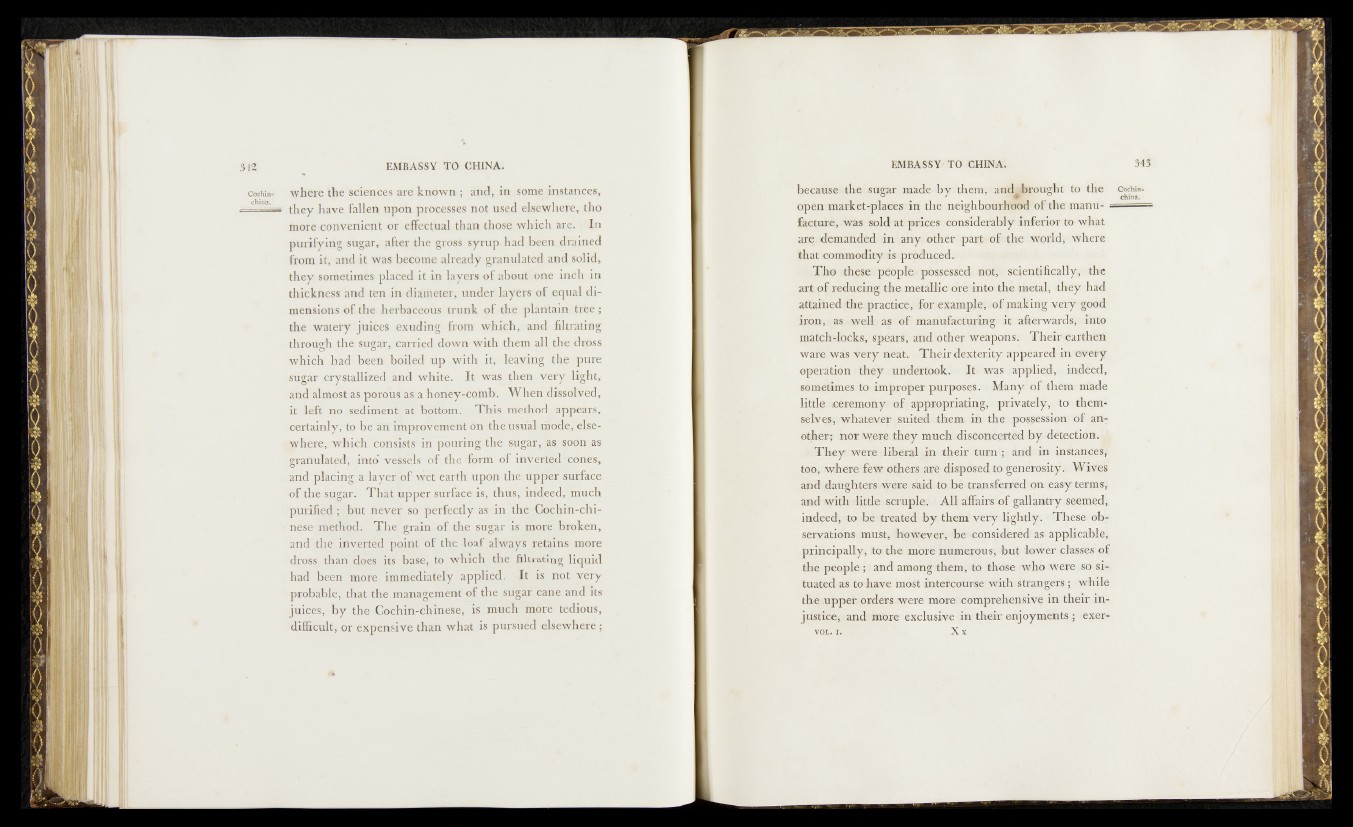
Cofthiii*
chifla;
where the scieaees are tiiiawir; and, in some instances:,
they have fallen upon processes not used elsewbete the
more convenient or effectual than those which ttr.e, «jin
puriffingisugar, after the gross syruphad been drained
from it, and it was become already granulated andisofid,
they sometimes placed it in layers of about one inch in
thickness-had ;ten in diameter, under layersofequai dimensions
of the herbaceous trunk of tbs plantain tree;
the watery juices exudteg-Jrotn whiilr, and filtratfeg
through the sugar .-.carried down with them -all the d^ss
which had been boiled up with it, leaving >the ipure
sugar crystallized and white. It was J.hen very light,
and almost as porous a&a honey-comb. When dissolved,
it left no:sediment^ at bottom. This method^appears,
certainly, to be~;f!i improvement 5n the usual iwode;,ylsi?-
y^here; which consists in pouring tin sugai.'fi^sO^jas
graimlMedr into vessels of the form of imt-ittd (ones,,
and placing a layerlof wet earth “upon the up^^sprface
of the sugar. That upper suilacc is, tlitis, indeed, much
purified; but never so perfectly,as in thetlpdchin-chi-
nese method. The grain of, the sugar is more broken,
and the inverted point of the l o a f always .retains an ore
dross than does its base» to which the Bloating liquid
had been more immediately applied. It is not very
probable, that the management of the .sugar cane and its
juices, by the Cochin-chinese, is much more tedious,
difficult, or expensive than what is pursued elsewhere;
becaUse thei sugar made byi'diem, - anff|teougm* to i the
o pm m arketriiaees in tixfe ueighbimrttwdlof'fe'hse'itoantt- -
facture, was sold at prices eonsiderabl^ iuierior to what
are demanded i n :,a n y » ,^ h i® i|p a ig } fw o r ld , where
that commoolity is produced,
Tho these-people*,possessed, notp scientifically, the
art of redaacieg-lbe metallic ore into the metal, they had
attained the »practice,, for »example; of making verysgood
iron, as well as .oh maniffa&tupng it - 'afterwards;» into
matchrlocks; spears|iandiotiher/wekpofls. ThmtJ'faiBtfafett
wafllwSs^Kery neat^>^Themdf^feM^y;app.earediin every
operation ,-sthey .undertook. I t : was ap pile,dwindled,
sometimes to improper’purposes. Many* qffthem made
little ceremony of appropriating;?* privately,jOto them*
selves; whatever suited them in the possess ioifilof another;;
kor iwsre they mxKh diseoncpFtM by -deteGtion. vf-
siThey Were iiberail in-their turn'; and in instances;
too, where few others are disposed M -gendrOstby. Wives
and daugh terst sy ere said to be transferred on easy terms»,,
and with little •scruple1-'1 All affairs ;of gallantry »seemed
indeed, to be » treated by them' v e ^ dightly. These obv
servatidns must, however, he;»cbns,id£redf ay applicable,;
principally; its©'the more numerous, but fdWer, kfessfesi of
the people ; and among them;«® those »who *w&&e| so si-
tuated as to have most :&terCOUr^e with strangers; while
the uppefc orders swere more* comprehensive in their in-
jhstiee;. and' more exchisiisse fin-' their enjoymentsm%@S*
w B L
Ccöhffcoliäirvii
VOL* I*